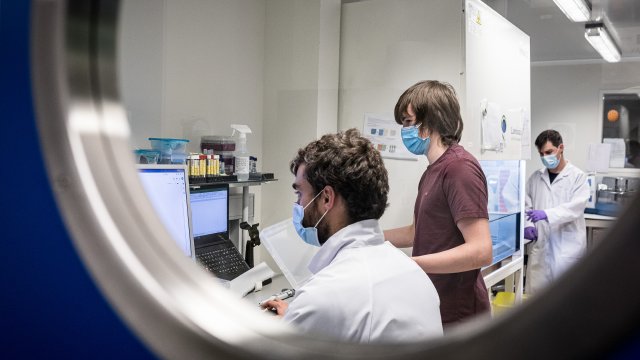In a very promising world first, Belgian researchers at the UCLouvain university have managed to identify and block the key that allows the coronavirus to attack cells – preventing a Covid-19 infection.
The discovery, published in "Nature Communications," raises the hope that an antiviral medicine could be developed to eradicate the virus in the event of infection or high-risk contact, announced the university on Tuesday.
The researchers point out that despite the vaccination campaigns, the population is not immune to the appearance of a new virus variant, and the long-term effectiveness of the vaccines remains unknown.
Additionally, some people still contract severe infections, while no effective treatment exists.
David Alsteens, a researcher at UCLouvain's Institute of Biomolecular Sciences and Technologies (LIBST), and his team have been working to understand the mechanisms used by the virus to infect a cell for two years now.
They investigated the interaction between sialic acids (AS), a type of sugar residue present on the surface of cells, and the spike (S) protein of SARS-CoV-2, to clarify its role in the infection process.
What has just been discovered?
It was already known that the sialic acids surrounding cells make it easier for viruses to identify their targets, but also that they facilitate the attachment of the virus and the infection of the cell.
Now, the researchers have identified a variant of those sialic acids that interacts more strongly with the virus' spike proteins than others. "In short, they have found the key that the virus uses to open the door to the cells," said the university.
Related News
- Covid-19 patients in Belgian hospitals drops below 2,000
- Working from home very popular among Belgians, particularly on Fridays
- Belgium in Brief: Mask mandates? Laisse tomber!
The researchers then decided to lure the virus into its own trap by preventing it from attaching to its host. The researchers managed to block the attachment points of the S protein and suppressed any interaction with the cell surface.
"If the virus cannot attach to the cells, it cannot enter and dies. That is how infection is prevented," said UCLouvain, adding that this discovery has the advantage that it works with any variant of the virus, regardless of mutations.
What does this mean for the future?
Now, the research team will carry out tests on mice to apply this blocker to the virus, and to test whether it works on an organism. The results should make it possible to develop an antiviral drug.
In other words, the discovery, which was published in the scientific magazine Nature Communications, raises hopes of an antiviral drug to eradicate the virus.

